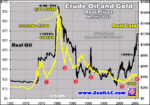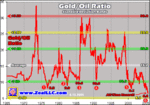Yuppie
Well-known member
- Messages
- 283
- Likes
- 48
I have been re-reading through the various threads on TT. I didn't seem to catch-on to what Iraj was espousing on the first read through all the threads. It has taken time for Iraj's message(s) to get through. The most significant, bar none, is the knowledge and use of fundamentals [especially with his latest posts in the Where is the market heading?... thread].
I am not totally new to trading. However, I am totally new fundamentals in every way. I see two types of fundamentals: one is the fundamentals of stocks - I have no problems with learning this, I have a few books, there are various pricing models, Iraj has mentioned CAPM (which I have started reading up on) - and so have an idea on how to go about this; second is the fundamental factors that drive the market(s) as a whole.
Learning about the fundamentals that drive the market is where I am really struggling at the moment. The last couple of days I have been searching the interweb, trying to find information about how to interperet events and how they affect the market. Unfortunately, so far I have only been able to find information on the fundamentals that affect stock prices.
The one thing I know I have learned from TT is (and I am in no doubt that I will learn more as I continue to re-read threads here on TT)... It is not the news/interest rate change/price of oil/etc that tell you whether the market is strong/weak and where it's going, but the reaction of the market participants.
Iraj said the following in his post here (incase it's deemed as taken out of context) today...
I am not sure how the dollar affects the market... not sure how interest rates affect the market... financial rallying, I assume, is stocks rallying - indicative of a strong market (when taken into account with other factors) I presume... not sure how oil or gold affects the market...
I'm don't wish to be spoon-fed. I am looking for sources where I can find out how to interperet these things on my own. Can anyone point me in the direction of any articles, books, threads, websites, etc. where I can start learning about this and really get my teeth into it?
From what I read in TT, I know there are a few of you here that have a good grasp of this. Perhaps someone might like to start a thread where we could start discussing fundamentals from the beginning... I might do this as I have so many questions. But I would like to be able to see if I can make some headway on my own first.
Great forum here guys 👍
Magnus
I am not totally new to trading. However, I am totally new fundamentals in every way. I see two types of fundamentals: one is the fundamentals of stocks - I have no problems with learning this, I have a few books, there are various pricing models, Iraj has mentioned CAPM (which I have started reading up on) - and so have an idea on how to go about this; second is the fundamental factors that drive the market(s) as a whole.
Learning about the fundamentals that drive the market is where I am really struggling at the moment. The last couple of days I have been searching the interweb, trying to find information about how to interperet events and how they affect the market. Unfortunately, so far I have only been able to find information on the fundamentals that affect stock prices.
The one thing I know I have learned from TT is (and I am in no doubt that I will learn more as I continue to re-read threads here on TT)... It is not the news/interest rate change/price of oil/etc that tell you whether the market is strong/weak and where it's going, but the reaction of the market participants.
Iraj said the following in his post here (incase it's deemed as taken out of context) today...
$ is going mad.. low interest rate ,,, financial rallying ,, Oil , Gold falling . would you short this market ? These are the underlying reasons for STRENGTH
I am not sure how the dollar affects the market... not sure how interest rates affect the market... financial rallying, I assume, is stocks rallying - indicative of a strong market (when taken into account with other factors) I presume... not sure how oil or gold affects the market...
I'm don't wish to be spoon-fed. I am looking for sources where I can find out how to interperet these things on my own. Can anyone point me in the direction of any articles, books, threads, websites, etc. where I can start learning about this and really get my teeth into it?
From what I read in TT, I know there are a few of you here that have a good grasp of this. Perhaps someone might like to start a thread where we could start discussing fundamentals from the beginning... I might do this as I have so many questions. But I would like to be able to see if I can make some headway on my own first.
Great forum here guys 👍
Magnus
Last edited:




